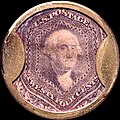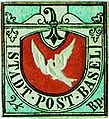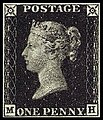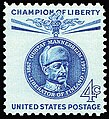Portal:Philately
| Philately portal | WikiProject Philately |
The Philately Portal
Philately is the study of revenue or postage stamps. This includes the design, production, and uses of stamps after they are issued. A postage stamp is evidence of pre-paying a fee for postal services. Postal history is the study of postal systems of the past. It includes the study of rates charged, routes followed, and special handling of letters.
Stamp collecting is the collecting of postage stamps and related objects, such as covers (envelopes, postcards or parcels with stamps affixed). It is one of the world's most popular hobbies, with estimates of the number of collectors ranging up to 20 million in the United States alone.
Anthony Neil Wedgwood Benn (3 April 1925 – 14 March 2014), known between 1960 and 1963 as The Viscount Stansgate, was a British Labour Party politician and political activist who served as a Cabinet minister in the 1960s and 1970s. He was the Member of Parliament for Bristol South East and Chesterfield for 47 of the 51 years between 1950 and 2001. He later served as President of the Stop the War Coalition from 2001 to 2014.
The son of a Liberal and later Labour Party politician, Benn was born in Westminster and privately educated at Westminster School. He was elected for Bristol South East at the 1950 general election but inherited his father's peerage on his death, which prevented him from continuing to serve as an MP. He fought to remain in the House of Commons and campaigned for the ability to renounce the title, a campaign which eventually succeeded with the Peerage Act 1963. He was an active member of the Fabian Society and served as chairman from 1964 to 1965. He served in Harold Wilson's Labour government, first as Postmaster General, where he oversaw the opening of the Post Office Tower, and later as Minister of Technology. (Full article...)Selected article -

issued in 1895
Postal service in the United States began with the delivery of stampless letters whose cost was borne by the receiving person, later encompassed pre-paid letters carried by private mail carriers and provisional post offices, and culminated in a system of universal prepayment that required all letters to bear nationally issued adhesive postage stamps.
In the earliest days, ship captains arriving in port with stampless mail would advertise in the local newspaper names of those having mail and for them to come collect and pay for it, if not already paid for by the sender. Postal delivery in the United States was a matter of haphazard local organization until after the Revolutionary War, when eventually a national postal system was established. Stampless letters, paid for by the receiver, and private postal systems, were gradually phased out after the introduction of adhesive postage stamps, first issued by the U.S. government post office July 1, 1847, in the denominations of five and ten cents, with the use of stamps made mandatory in 1855. (Full article...)Selected images
Did you know (auto-generated)

- ... that both of Karl R. Free's New Deal-era U.S. post office murals with Native American subjects have been challenged as offensive?
- ... that a new Christmas stamp that debuted in the 350-person town of Bethlehem, Georgia, in 1967 got so much attention that the two-employee post office had to hire forty-three temporary workers?
- ... that Amrita Sher-Gil's painting Hill Women appeared on a 1978 Indian postage stamp?
- ... that in 2007, Arthur Gray's £2 Kangaroo and Map stamp sold for a world record price for a single Australian stamp?
- ... that after Irish post office clerk Maureen Flavin Sweeney reported worsening weather conditions, Dwight D. Eisenhower agreed to postpone D-Day by 24 hours?
- ... that Argentinian Ricardo D. Eliçabe qualified as a physician, co-founded a petroleum refinery, and wrote about forgeries of Bolivia's first stamps?
General images -
Selected stamp -
The Whole Country is Red is a Chinese postage stamp, issued on 24 November 1968, which contained a problem with the design. The stamp features a map of China with the words "The Whole Country is Red" (Chinese: 全国山河一片红), with a worker, farmer, and soldier standing below with copies of Quotations from Chairman Mao, but Taiwan is not shaded red, merely outlined. The face value of the stamp is 8 fen.
Taiwan was not shaded red as at the time of printing, it was (and remains so as of 2024[update]) under the control of the Republic of China instead of the PRC. The official reason given for the withdrawal of the stamp was that the Spratly and Paracel Islands were missing from the map, as well as the borders with Mongolia, Bhutan, and Myanmar being incorrectly drawn. The stamp had been distributed for less than half a day when an editor at China Cartographic Publishing House noticed the problem with Taiwan and reported it to the Ministry of Posts and Telecommunications. As a result, all Chinese post offices had to stop selling the stamp and return all copies, with only a small quantity making it to private collectors. The designer of the stamp, Wang Weisheng, said in an AFP interview, "For a long time I was really worried that I would be jailed". (Full article...)List articles

- List of philatelists
- List of most expensive philatelic items
- List of postage stamps
- Lists of people on postage stamps (article) • (Category page)
- List of entities that have issued postage stamps (A–E)
- List of entities that have issued postage stamps (F–L)
- List of entities that have issued postage stamps (M–Z)
- List of postal services abroad
- Timeline of postal history
Related portals
Topics
Categories
WikiProject
![]() WikiProject Philately organizes the development of articles relating to philately. For those who want to skip ahead to the smaller articles, the WikiProject also maintains a list of articles in need of improvement or that need to be started. There are also many red inked topics that need to be started on the list of philatelic topics page.
WikiProject Philately organizes the development of articles relating to philately. For those who want to skip ahead to the smaller articles, the WikiProject also maintains a list of articles in need of improvement or that need to be started. There are also many red inked topics that need to be started on the list of philatelic topics page.
Selected works
- Williams, Louis N., & Williams, Maurice (1990). Fundamentals of Philately {revised ed.). American Philatelic Society. ISBN 0-9335-8013-4.
{{cite book}}: CS1 maint: multiple names: authors list (link) - Hornung, Otto (1970). The Illustrated Encyclopedia of Stamp Collecting. Hamlyn. ISBN 0-600-01797-4.
- Stuart Rossiter & John Fowler (1991). World History Stamp Atlas (reprint ed.). pub: Black Cat. ISBN 0-7481-0309-0.
Wikimedia
The following Wikimedia Foundation sister projects provide more on this subject:
-
Commons
Free media repository -
Wikibooks
Free textbooks and manuals -
Wikidata
Free knowledge base -
Wikinews
Free-content news -
Wikiquote
Collection of quotations -
Wikisource
Free-content library -
Wikiversity
Free learning tools
Other Portals
Sources
- ^ "Philatelic Collections: General Collections". British Library. 2003-11-30. Archived from the original on 30 June 2011. Retrieved 2011-01-16.















![Image 13Unissued 1956 £1 Jamaican chocolate and violet, the first stamp designed for Queen Elizabeth II. Held in the British Library Crown Agents Collection.[1]](http://upload.wikimedia.org/wikipedia/commons/thumb/9/9b/Stamp_Jamaica_1956_unissued_1sh.jpg/120px-Stamp_Jamaica_1956_unissued_1sh.jpg)














































